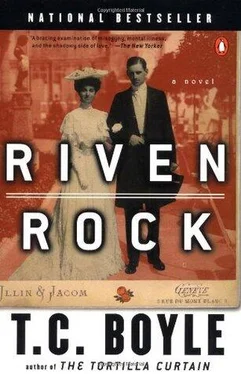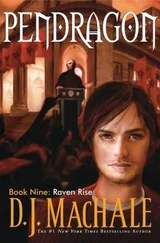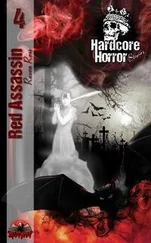T. Boyle - Riven Rock
Здесь есть возможность читать онлайн «T. Boyle - Riven Rock» весь текст электронной книги совершенно бесплатно (целиком полную версию без сокращений). В некоторых случаях можно слушать аудио, скачать через торрент в формате fb2 и присутствует краткое содержание. Год выпуска: 1999, Издательство: Penguin Books, Жанр: Современная проза, на английском языке. Описание произведения, (предисловие) а так же отзывы посетителей доступны на портале библиотеки ЛибКат.
- Название:Riven Rock
- Автор:
- Издательство:Penguin Books
- Жанр:
- Год:1999
- ISBN:нет данных
- Рейтинг книги:5 / 5. Голосов: 1
-
Избранное:Добавить в избранное
- Отзывы:
-
Ваша оценка:
- 100
- 1
- 2
- 3
- 4
- 5
Riven Rock: краткое содержание, описание и аннотация
Предлагаем к чтению аннотацию, описание, краткое содержание или предисловие (зависит от того, что написал сам автор книги «Riven Rock»). Если вы не нашли необходимую информацию о книге — напишите в комментариях, мы постараемся отыскать её.
Riven Rock — читать онлайн бесплатно полную книгу (весь текст) целиком
Ниже представлен текст книги, разбитый по страницам. Система сохранения места последней прочитанной страницы, позволяет с удобством читать онлайн бесплатно книгу «Riven Rock», без необходимости каждый раз заново искать на чём Вы остановились. Поставьте закладку, и сможете в любой момент перейти на страницу, на которой закончили чтение.
Интервал:
Закладка:
O‘Kane wanted to deny it, wanted to hoot and caper and tease the old man’s hair right up off his head, but he was drunk and he knew what was coming. He knew it, but somehow he couldn’t seem to muster the energy to care.
“You hurt-a my daughter, Eddie, and now you gonna answer to me.”
That was when the two goons moved in close with the ax handles and started chopping away at the fragile tottering tree that was Eddie O‘Kane. He went down after the first couple of blows, and he stayed down, cradling his head, even as the tempered oak sought out his ribs and his knees and the tough little fist of bone at the base of his spine. The last thing he remembered was Pietro cursing him and the soft wet kiss of the spittle on his cheek.
He came out of it right at the end of his first day in the hospital, a smell of hot food, the rattle of a cart, a dapple of light on the ceiling as the sun sank out of sight. There were flowers on the table beside him — sent, he would later learn, by Katherine, the Ice Queen herself — and he was in a room that had two beds in it. He didn’t feel a whole lot of curiosity about who was occupying the other one — his head ached too much — but later, after the tide of nurses had ebbed, he saw that it was a child, a little boy, all wrapped up like King Tut and with his leg in a cast suspended from a hook over the bed. That was when O‘Kane began to wonder about the extent of the damage to his own bodily self, and he ran a reluctant hand — his left hand; the right was pinned fast to his chest — down one side of his rib cage and up the other. He felt pinched and constricted, as if he couldn’t fill his lungs and take a breath of air, and he knew that he was all wrapped up too, and he was wondering about that in a drifting remote sort of way — his ribs, they’d broken his ribs — and then he was running through the streets of the North End with some lady’s pocketbook in his hand and a whole horde of people chasing after him, and wasn’t Mr. McCormick one of them?
When he woke the next morning, there was a doctor standing over him, or at least he looked like a doctor, white jacket, clipboard and regulation smile. “How are you feeling?”
“Scrambled,” O‘Kane managed, and he tried to lift his head but couldn’t. “Three eggs in a pan.”
“It could be worse.” The doctor’s smile was eerily serene. “You’ll walk again — in three to six months — but you’ll very likely carry a limp the rest of your life. You’ve shattered your right patella and there’s a hairline fracture of the femur, just above it, in addition to a compound break of the tibia — the shinbone. You’ve got three broken ribs on the right side, a fractured wrist — also on that side — and oh yes, as you’ve no doubt noticed, your arm is in a cast too. The right ulna is fractured — your elbow, that is.” He paused. “Do you remember anything of the incident? The identity of your attackers, for instance? The police want to know if you can provide a description.”
O‘Kane looked into that fixed smile and tried on a smile of his own, albeit a weak and evanescent one. “No,” he said, “I don’t remember a thing.”
The next day they wheeled his bed out the door and all the way down the corridor to the admissions office: Mr. McCormick was on the line. “Hello? Ed-Eddie? Are you all — are you okay?”
“Sure,” O‘Kane said. “I’ll be up and about in no time.”
Mr. McCormick’s voice was high and excited, sticking on the consonants and ratcheting up over the vowels. “I w-wish I’d been there with you, to — to fight, I mean. I would have given them something to think about, you know I would—”
O‘Kane, miserable, broken in half, reaping his own sour harvest, tried nonetheless to placate him — it was his job, after all. “I know you would. But don’t worry, don’t worry about a thing.”
A pause. Mr. McCormick’s voice, pinched almost to nothing: “You-you‘ re coming back, Eddie, aren’t you? Back here with m-me and Mart? ”
What could he say? Of course he was coming back, coming back like a convict to his ball and chain every time he tries to lift his foot from the floor. It was sad to say, sadder even to admit, but Mr. McCormick was his life. “Yeah,” he said, “I’ll be back.”
On the third day, Giovannella appeared. He was dozing at the time, drifting deliciously in and out of consciousness while the mother of the boy in the next bed read aloud from a book of children’s stories in a soothing soft mellifluous voice: “‘Pooh always liked a little something at eleven o’clock in the morning, and he was glad to see Rabbit getting out the plates and mugs…‘”
“Eddie?”
The story faltered, just the smallest pebble in the path of that smooth onrolling voice, and then it picked up again: “… and when Rabbit said, ”Honey or condensed milk with your bread?“ he was so excited that he said, ”Both“…‘ ”
“Eddie?”
He opened his eyes. The ceiling was there, right where he’d left it, and then a glint of the boy’s mother’s blondness combed out over her shoulders, and finally, Giovannella. Her face hovered over him, an anxious look, the ends of her hair so close he could smell the shampoo she’d used that morning. He smiled, one of the smiles his mother had no name for because it was spontaneous and true: how could he blame Giovannella? She’d provoked him, sure, but he had no right to touch her, never, and he’d had it coming to him for years now, a debt of violence accruing.
“I talked to my father,” she said, and he watched her eyes and her ringless fingers as she tucked the hair behind her ears. It was January of 1929 and she was thirty-eight years old, ripe in the bosom in a white blouse and yellow cardigan, her face getting rounder by the day and the flesh settling under her chin. “It’s going to be a small wedding, just the Dimuccis and the Fiocollas and maybe Mart, Pat and Nick, if you want — but in the church, with a white gown and rice and everything else.”
He didn’t know what to say, but he felt it, something stirring in the deep yearning root of him, inside, beneath the sixty yards of gauze and tape and the rock-hard plaster and the flesh that was as tender and yielding as a — as a bride’s. Or make that a groom’s. He was going to marry Giovannella, adulterously and bigamously, and legitimate his two surviving children, Guido of the heavy O‘Kane shoulders and Edwina with the green eyes in her sweet vanilla face, and this was it, this was what he’d been waiting for all his life: his three o’clock luck. It wasn’t money or orange groves or a fleet of cars, but this woman hanging over him in a moment of grace and poignancy and the children waiting in the wings. Okay. All right. He was ready. He tried to nod his head and winced.
Giovannella was smiling down on him, the strong white teeth, the everted lips, the faint hairs trailing all the way down her temple to the hollow at the base of her jaw. “As soon as you can walk, of course,” she said, and her voice was every bit as sweet and assured and anodynic as that mother’s in the next chair over. “We don’t do anything till you can walk. Okay, Eddie?” He felt the soft pressure of her hand on his.
“Okay,” he said.
The wedding was in April, on a fine blue-scraped day with every flower in creation bursting all around them, and after the ceremony at Our Lady of the Sorrows, O‘Kane and Giovannella and Guido and Edwina and all the Dimuccis and Fiocollas and half the Italians in Santa Barbara (Italians, not wops, most definitely not wops anymore) piled into the McCormick automobiles and had their reception on the front lawn at Riven Rock, Mr. McCormick looking on from the high barred windows of his room. They’d hoped to have him right down there amongst the guests, but Kempf vetoed it — after the incident with Katherine, not to mention the complication of the professional girl, which Kempf had never found out about, thank God in His Heaven, Mr. McCormick had to be isolated from women again. Except for Nurse Gleason, that is, and she gave him a wide-enough berth, at least at first.
Читать дальшеИнтервал:
Закладка:
Похожие книги на «Riven Rock»
Представляем Вашему вниманию похожие книги на «Riven Rock» списком для выбора. Мы отобрали схожую по названию и смыслу литературу в надежде предоставить читателям больше вариантов отыскать новые, интересные, ещё непрочитанные произведения.
Обсуждение, отзывы о книге «Riven Rock» и просто собственные мнения читателей. Оставьте ваши комментарии, напишите, что Вы думаете о произведении, его смысле или главных героях. Укажите что конкретно понравилось, а что нет, и почему Вы так считаете.












